-
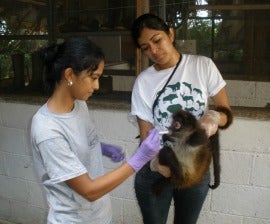
HSI’s Grettel Delgadillo handles a spider monkey with ARCAS staff in Guatemala. Tracy O’Toole/HSI
-

Parrots at ARCAS rescue center in Guatemala. Jennifer Felt/HSI
-
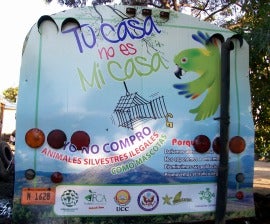
Ad against the illegal wildlife trade graces the back of a bus in Nicaragua. Jennifer Dinsmore/HSI
-
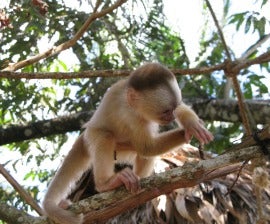
White-faced capuchin in Peru. Marta Prado/HSI
-
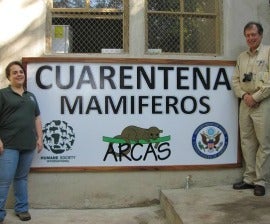
HSI-LA Regional Director Cynthia Dent and HSI President Andrew Rowan outside the mammal quarantine partially funded by HSI at ARCAS in Guatemala. Cynthia Dent/HSI
-
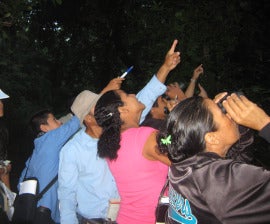
Learning to lead bird-watching ecotourists in Nicaragua. Toby Bloom/HSI
Latin America is home to many hotspots for the illegal wildlife trade, due to its rich biodiversity and the difficulty of enforcing of wildlife protection laws. Here you can find endemic species such as the pink boa, and other endangered or threatened species, such as leatherback turtles, red-lored Amazon parrots, and howler monkeys. HSI Latin America is at the forefront of protecting these unique animals from poachers who would smuggle them across borders in a dangerous trade throughout many Latin American countries and beyond.
Located in San Jose, Costa Rica, the HSI LA office is well-situated to run hands-on programs in the border areas as well as work with government officials to strengthen wildlife laws and enforcement throughout the region. Since it opened in 2004, HSI LA has worked with to safeguard wildlife in Latin America, advocating for strong wildlife protection policies and creating programs that promote the rehabilitation and re-release of victims of the illegal wildlife trade, educational campaigns, and networking.
Coordinating with governments
The HSI LA office is centrally located and bilingual. Staff work directly with Latin American governments to offer assistance in complying with the Convention on the International Trade in Endangered Species of Wild Fauna and Flora (CITES), and act as liaisons between governments and local NGOs.
Outreach campaigns
HSI LA works with graphic designers and NGOs to create bilingual outreach campaigns that focus on keeping wildlife in their habitats by targeting certain segments of the population. Ecotourism campaigns, educational materials and advertisements to the general public must all be approved before going to print, and HSI LA ensures that the campaigns are appropriate to their areas, and the messages are conveyed clearly and succinctly.
Providing economic alternatives
Community ecotourism projects are a good way to highlight local wildlife and culture to travelers, and to show community members a non-extractive method to support themselves through the unique environment around them. HSI LA acts as a resource for communities looking to implement ecotourism programs by arranging for instruction on small business practices, sustainability plans, biology and wildlife classes, and guide training.
Building capacity of local NGOs/supporting rescue centers
HSI LA works closely with International Trade & Development to support local rescue centers. Together with Trade, HSI LA conducted a comprehensive field survey of the illegal wildlife trade in Peru, and an additional study in Costa Rica, El Salvador, Guatemala, Honduras and Nicaragua, including an examination of the status of wildlife rescue centers in each country. Both offices are currently working towards building the capacity of the rescue centers to adequately care for, rehabilitate and re-release, when possible, the victims of illegal wildlife trade; as well as creating a strong network of rescue centers throughout Central America.
Training of government personnel
Staff from HSI LA coordinate trainings for the customs officials, police officers and other law enforcement representatives who are on the front lines in the war against illegal wildlife trade. They attend every training to ensure the material is received and to bring feedback to HSI in DC.
Lasting legacy: animal-handling curriculum
The HSI LA office helped to create an interactive CD and curriculum on animal handling, and has traveled to border areas throughout Central America to teach the curriculum and leave copies of the CD behind, with the idea that the curriculum will circulate for many years in the future. HSI LA was also instrumental in creating a curriculum for Colombia to be used at a joint workshop with Interpol, thereby broadening the scope of the animal welfare message.
To access the content of HSI’s animal handling interactive CD and curriculum (now available online), please click here [in Spanish].
